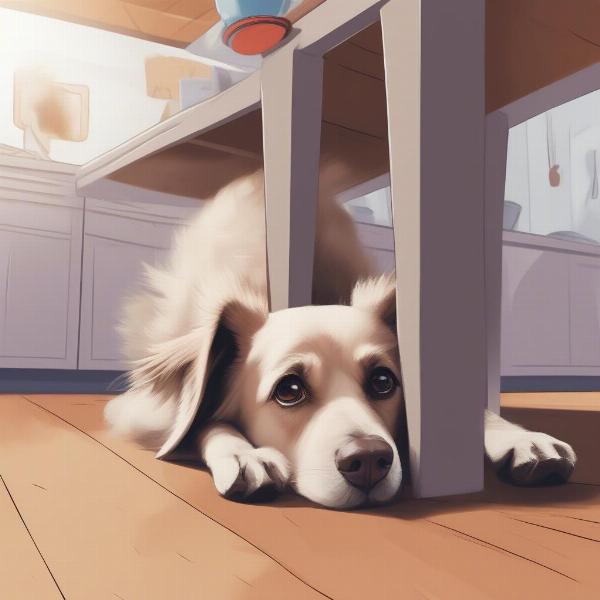Stopping your dog from urinating on the carpet can be frustrating, but it’s a solvable problem. Understanding the reasons behind this behavior is the first step to addressing it. Whether it’s a puppy still learning the ropes, an older dog with a medical condition, or a behavioral issue, this guide will provide practical solutions to help you reclaim your carpets and maintain a harmonious home. We’ll explore everything from establishing a solid potty training routine to identifying and addressing underlying medical issues.
Why is My Dog Peeing on the Carpet?
Several factors can contribute to a dog urinating on the carpet. Medical conditions like urinary tract infections, bladder stones, kidney disease, or even cognitive decline can cause increased urination and accidents. In puppies, incomplete house training is a common culprit. Anxiety, stress, territorial marking, or submissive urination can also be contributing factors in dogs of all ages. Determining the root cause is crucial for effective treatment.
Establish a Potty Training Routine
A consistent potty training routine is essential, especially for puppies. Take your dog out frequently, especially first thing in the morning, after meals, after naps, and before bedtime. Choose a designated potty spot and reward your dog with praise and treats when they eliminate there. Consistency is key to success.
Clean Up Accidents Thoroughly
When accidents happen, it’s crucial to clean the area thoroughly with an enzymatic cleaner specifically designed for pet urine. This eliminates the odor that can attract your dog back to the same spot. Avoid using ammonia-based cleaners, as the smell can resemble urine and encourage repeat offenses.
Address Medical Issues
If your dog suddenly starts urinating indoors, a vet visit is essential. Your vet can diagnose underlying medical conditions that may be contributing to the problem and recommend appropriate treatment. Early diagnosis and treatment can significantly improve your dog’s health and reduce accidents.
Manage Anxiety and Stress
Anxiety can manifest in various ways, including inappropriate urination. Identify and address potential stressors in your dog’s environment. This could involve providing a safe space, using calming pheromone diffusers, or consulting a veterinary behaviorist for professional guidance.
 Dog Showing Anxiety Signs
Dog Showing Anxiety Signs
How to Stop a Dog Peeing on a Carpet: A Step-by-Step Guide
- Consult your veterinarian: Rule out any underlying medical conditions.
- Establish a consistent potty break schedule: Take your dog out frequently and predictably.
- Reward successful potty breaks: Positive reinforcement encourages desired behavior.
- Clean accidents thoroughly: Use an enzymatic cleaner to eliminate odors.
- Manage anxiety and stress: Provide a safe and comfortable environment.
- Consider professional help: A certified dog trainer or behaviorist can provide personalized guidance.
Conclusion
Stopping your dog from urinating on the carpet requires patience, consistency, and a multi-pronged approach. By addressing potential medical issues, establishing a solid potty training routine, managing anxiety, and cleaning accidents thoroughly, you can create a cleaner, healthier, and more harmonious environment for both you and your furry friend. Remember, addressing the underlying cause is crucial for long-term success in how to stop a dog peeing on a carpet.
FAQ
- Why does my dog pee on the carpet after I’ve just cleaned it? The lingering odor, even if faint to humans, can still attract your dog. Use an enzymatic cleaner to completely eliminate the urine smell.
- How can I tell if my dog’s peeing is a medical issue? Sudden changes in urination frequency, straining to urinate, or blood in the urine are all signs to consult your vet.
- Is it ever too late to potty train a dog? No, it’s never too late. Patience and consistency are key.
- What are some common dog anxiety triggers? Loud noises, changes in routine, separation from owners, and new people or pets can all trigger anxiety.
- Can spaying or neutering help with marking behavior? In some cases, it can reduce or eliminate marking behaviors.
Related Articles
- Prevent dog from peeing on carpet
- How to stop dog wee on carpet
- How to keep dogs from urinating on rugs
ILM Dog is your trusted resource for expert dog care advice. We cover everything from breed selection to health, training, nutrition, grooming, and more. Whether you’re a new dog owner or a seasoned pro, our team of experts is dedicated to helping you provide the best possible care for your canine companion. how to make your dog stop peeing on the carpet For expert advice and personalized support, contact us at [email protected] or +44 20-3965-8624.